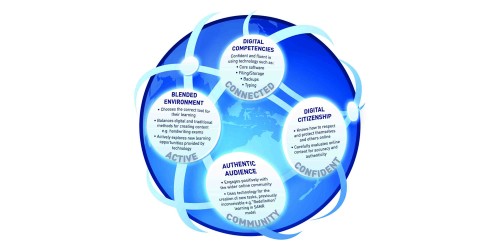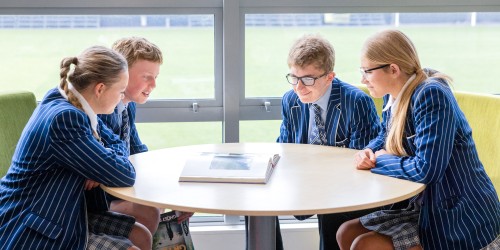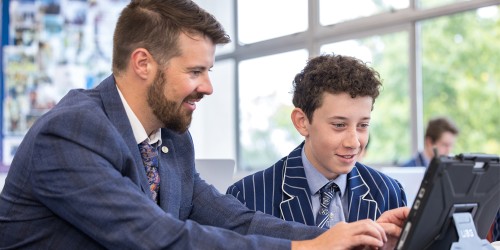
You are logged in as
Logout
You are logged in as
LogoutThis website uses cookies to distinguish you from other users. This helps us to provide you with a good user experience and also allows us to improve our website. More information

Please click here to learn about Behaviour Management in the Middle School.
 The vision for e-Learning at St Andrew’s College has the student at the centre of all learning and envisions learners who can connect confidently and actively in their community. We aim to produce responsible students who make informed decisions when using ICT in their learning.
The vision for e-Learning at St Andrew’s College has the student at the centre of all learning and envisions learners who can connect confidently and actively in their community. We aim to produce responsible students who make informed decisions when using ICT in their learning.
To support this vision, all students are required to bring their own laptop, selected from a range of recommended models which are described in more detail here. This environment where there is one computer of comparable functionality to each student is known as 1:1 Computing. This is different from a Bring Your Own Device (BYOD) programme where students can bring whatever computer they already own to class.
We believe there are several reasons why 1:1 computing is important for today’s students:
Digital Citizenship at St Andrew’s College comprises four strands which are embedded throughout the curriculum. This is reinforced for Year 9 students who are enrolled in a whole year Digital Literacy Programme.

| CONNECTED | CONFIDENT |
|
Being a connected student at St Andrew’s College is to have access to various technologies. A connected learner is fluent in basic computer competencies such as creating and saving files, backing up their content, working towards becoming a fluent typist, and has experience with core software to further their learning such as Microsoft Office 365 (or equivalent).
|
Being a confident student at St Andrew’s College is to understand what it means to be a Digital Citizen – a person that interacts with the digital world around them in a responsible and safe way. This includes:
Students who are confident users of technology at St Andrew’s College use the digital competencies of a connected student in constructive ways to further their learning. |
| ACTIVE | COMMUNITY |
|
Students at St Andrew’s College will be active users of digital tools in their learning both in and outside of the classroom. e-Learning promotes the ability for students to learn ‘anywhere and anytime’ by breaking down the physical distinction between classwork and homework. Active e-Learners will make use of College resources such as Microsoft OneNote, to obtain resources from their teacher, know when assessments are due and engage in collaborative learning with their classmates and beyond. Active learners will explore opportunities for new styles of learning through technology, while recognising traditional skills, such as handwriting, remain critical to complete formal assessment. |
Students at St Andrew’s College will engage within the wider community of learners and experts by utilising technology and the opportunities it presents to connect with authentic audiences beyond the traditional walls of the classroom. Exercising all facets of responsible Digital Citizenship, students can share their learning through various online platforms. Teachers will also create opportunities for shared learning experiences with students from other schools and countries, along with bringing subject expertise into the classroom through technologies such as video-conferencing.
|
Other Expectations
Points to Note
Additional Responsibilities
 The following homework guidelines are taken into consideration when teachers assign homework to any student at St Andrew’s College:
The following homework guidelines are taken into consideration when teachers assign homework to any student at St Andrew’s College:
We believe:
Parents can support their child’s learning at any level of schooling through the following:
Weekly Feedback reports are an opportunity to get feedback on the completion and quality of homework in each subject. Useful resources on learning: stac.nz/LearningResources
 Learning Support aims to provide students who have learning challenges with the extra help they need to develop their foundation skills in reading, writing and mathematics in particular. At Years 9 and 10 we have four accelerated learning classes, two at each year level, where students get intensive instruction to help them catch up so they are ready to tackle Level 1 NCEA. At Years 9 and 10 we also provide a literacy option for students who need to improve their reading and writing skills. Intensive one-on-one private tuition is also available for students in any year group with our Seabrook McKenzie tutors. There are also a range of extra tutoring opportunities.
Learning Support aims to provide students who have learning challenges with the extra help they need to develop their foundation skills in reading, writing and mathematics in particular. At Years 9 and 10 we have four accelerated learning classes, two at each year level, where students get intensive instruction to help them catch up so they are ready to tackle Level 1 NCEA. At Years 9 and 10 we also provide a literacy option for students who need to improve their reading and writing skills. Intensive one-on-one private tuition is also available for students in any year group with our Seabrook McKenzie tutors. There are also a range of extra tutoring opportunities.
At Year 11, the Learning Support Department runs special study groups for students who need help in specific areas.
 Pastoral care is the integration of the academic, social and religious dimensions of the school, so that an atmosphere of care prevails.
Pastoral care is the integration of the academic, social and religious dimensions of the school, so that an atmosphere of care prevails.
Pastoral care seeks to respond to student needs such as:
The goals of the St Andrew’s College pastoral care system are to connect students to a key caring adult in the College system, to foster a sense of well-being amongst students, and to encourage students to maximise their potential in the school environment.
The Pastoral Care Committee meets weekly to discuss individual student’s needs and to develop policies to meet them. It is chaired by the Principal of Secondary School and includes the College Chaplain, the Director of Boarding, the Heads of Middle School and Senior College, the Head of Guidance, the Head of Learning Support, Director of High Performance Sport and the Director of International and Exchange Students. The committee co-ordinates the wide network of people providing pastoral care, which includes Deans, tutors, boarding house staff and Learning Support staff.
 Having the skills, dispositions and characteristics to lead one’s own learning is vital, both at and beyond school. That is why the key competencies of managing self, thinking, using language, symbols and texts, relating to others, and participating and contributing are taught alongside curriculum content and skills. Our aim is for students to understand what it means to be an effective learner. We want them to be independent, life-long learners. We want them to develop into adults who are equipped with the skills and knowledge to navigate their future with confidence. We want them to flourish.
Having the skills, dispositions and characteristics to lead one’s own learning is vital, both at and beyond school. That is why the key competencies of managing self, thinking, using language, symbols and texts, relating to others, and participating and contributing are taught alongside curriculum content and skills. Our aim is for students to understand what it means to be an effective learner. We want them to be independent, life-long learners. We want them to develop into adults who are equipped with the skills and knowledge to navigate their future with confidence. We want them to flourish.
Manage Yourself
Be motivated, disciplined, reliable, resourceful, and resilient.
Think
Be curious about and critical of information, experiences, and ideas, using a range of processes and strategies.
Use Language, Symbols and Texts
Work with and make meaning of the ways in which ideas are expressed.
Relate to Others
Interact effectively with a diverse range of people.
Participate and Contribute
Be constructively involved in your community, at a classroom, College, local, national and/or global level.
